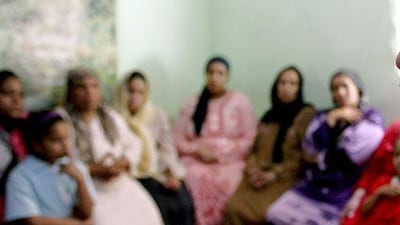CAIRO // The practice of circumcising young girls is slowly declining in Egypt, according to human-rights campaigners. A survey of Egyptian youth released last month by the Population Council, an international non-governmental organisation focused on public health, reported that among more than 15,000 young people interviewed across Egypt, only 66.2 per cent of girls 10 to 14 years old have experienced some form of genital mutilation, while 92.6 per cent of women between 25 and 29 have undergone the procedure.
The practice of female genital mutilation (FGM) remains common in Egypt, particularly for women in rural areas and those with low incomes. Another report by the ministry of state for family and population that will be published this year says 96 per cent of Egyptian women 15 to 49 who have been married were victims of FGM. Nevertheless, the report concluded that the reduction in the incidence of FGM - however gradual - points to the success of a government-led campaign to combat the practice.
Campaigners said the incremental but significant reduction in FGM shows the effectiveness of confronting cultural taboos with highly public media campaigns. They say the FGM campaign, along with a 2008 decision by legislators to criminalise the practice, offers a lesson for policymakers on how to tackle other deeply entrenched but little-discussed cultural norms in a conservative society such as Egypt's.
Vivian Fouad, a training co-ordinator for the FGM-Free Village Model Programme at the ministry of state for family and population, which has led the government's fight against FGM since 2003 said: "For me, the most important factor was the revolution in media. "In the beginning, when people were against FGM, they put this in newspapers and in books. And of course, the people who practise FGM are illiterate people. So media [TV and radio], I think it's a very important tool for illiterate people and people who don't follow newspapers and books."
FGM is a chiefly cultural - as opposed to religious - practice common for girls in north-east and central Africa, as well as some parts of Asia. While FGM, also known as female circumcision, can include a variety of different procedures, the World Health Organisation defines it as any mutilation of the external female genitalia without a valid medical reason. Women's rights campaigners have opposed FGM for generations (he first anti-FGM campaign in Egypt started in 1928) because the procedure is dangerous and the girls who undergo it tend to be far too young to be able to consent. The procedure is supposed to reduce a woman's sexual sensitivity and appetite, but it can lead to medical complications, particularly when performed in unsanitary conditions.
Recent incidents brought the fight against FGM to the public's attention, Ms Fouad said. In 2007, two girls died after FGM procedures in Egyptian hospitals. Their deaths were highly publicised thanks to Egypt's recently emboldened independent media, which has enjoyed fewer government restrictions within the past decade. Independent newspapers carried the girls' stories on their front pages, prompting television talk shows to discuss FGM in earnest. News of the deaths built on television adverts launched by Ms Fouad's campaign years earlier that described FGM for what it was: a harmful cultural practice with no basis in medical science or religious ideology.
For the first time, Ms Fouad said, discussions of FGM were no longer about wealthy or educated women's rights activists lecturing uneducated women in villages. Ghada Barsoum, a programme manager for the Population Council's poverty, gender and youth programme, said: "Talk shows are very popular in Egypt. They had prominent religious figures coming to talk about FGM. They had lawmakers. It was a well-organised campaign, and it this was not the first time that FGM made it into the media.
"It's a taboo issue, you don't want to talk about it even in your own house," Ms Barsoum said. "The breakthrough was bringing this taboo issue to the media, so that people can start to make a conscious decision about whether they are going to do it or not." Previous attempts to make FGM a topic of public discussion had failed, Ms Barsoum said, mainly because fears of offending local sensitivities led campaigners to skirt the issue. Television adverts that were aired before the FGM-Free Village Programme made obscure allusions to FGM without any direct references to the practice itself or female sexuality. The message was lost.
"There were a few mistakes that were avoided this time," Ms Barsoum said. "Before then, they used to talk about it without talking about it." The direct media attention, blunt, informative and to the point, was buttressed by several new laws. A law passed in 2008 finally made FGM illegal in all its forms, whether it is performed by a doctor or traditional practitioner, but its full enforcement will require a sweeping change in the attitudes that have allowed the practice of FGM in Egypt for centuries.
A survey by Ms Fouad's programme found that Egyptian girls are 10 per cent less likely to be circumcised than girls of their parents' generation. While that certainly counts as progress, it also means that reducing or eliminating genital mutliation will take decades more work, she said. "Female genital mutilation is a very, very old tradition. We have to be patient to see the results through the generations, not immediately," Ms Fouad said. "This is my message to all activists against FGM: don't give up. Don't say I made many efforts and people don't want us or people aren't convinced."
@Email:mbradley@thenational.ae

